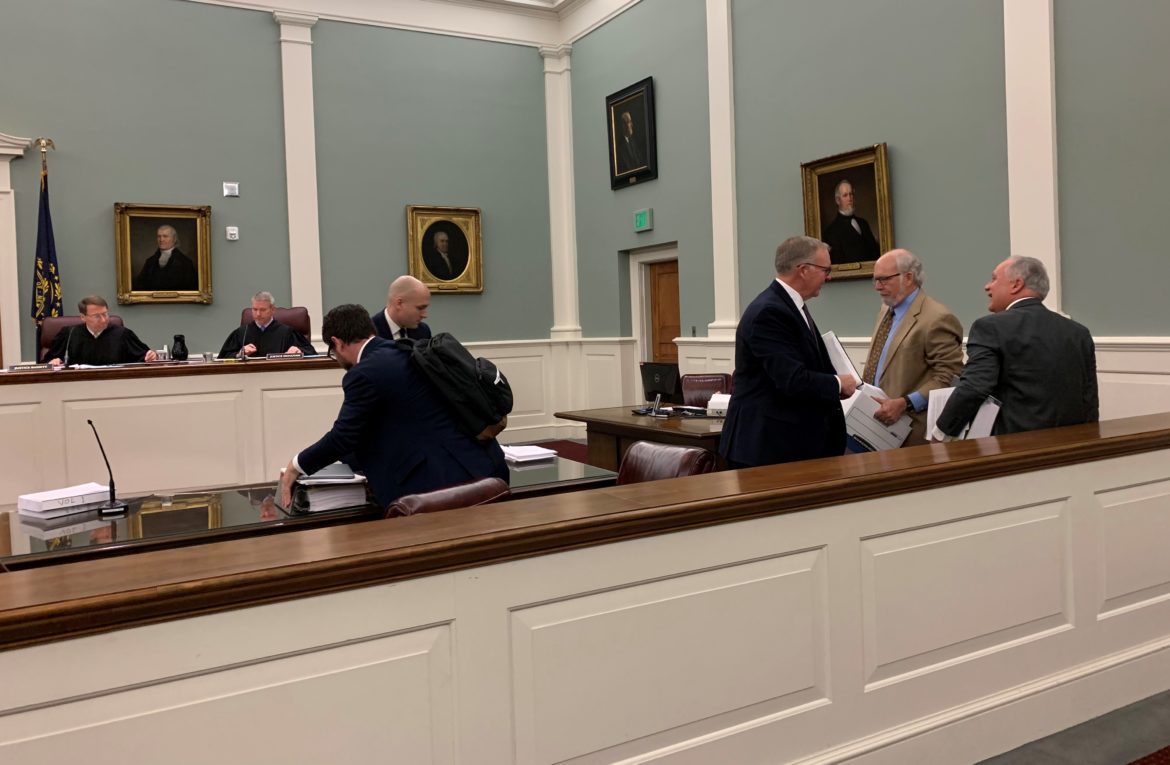By NANCY WEST, InDepthNH.org
CONCORD – The state Supreme Court heard oral arguments in three separate cases Wednesday that could fundamentally change how much information the public is entitled to know about the actions of their public employees.
Lawyers for the Seacoast newspapers, the Union Leader Corp. and Keene State College Professor Marianne Salcetti and her students all argued separate cases making essentially the same argument – that the justices should overturn a decision their predecessors made on the court 26 years ago in Union Leader v. Fenniman.
The public has been denied important information about how public employees perform their duties ever since the Fenniman case, they argued.
“Fenniman as attorney (Gilles) Bissonnette said in his brief was wrong then. It’s wrong now,” said Gregory Sullivan representing the Union Leader with ACLU-NH’s Bissonnette in appealing to obtain an unredacted audit report that investigated the Salem Police Department.
Sullivan has a thorough knowledge of the Fenniman case because he represented the Union Leader in 1993 and unsuccessfully argued for the release of documents involving former Dover Police Chief William Fenniman.
It was the first case Sullivan argued before the state Supreme Court, which then ruled that police internal affairs documents will be considered under the internal personnel practices exemption of the right-to-know law, RSA 91a.
“I’m here to blame the court,” Sullivan said, getting a laugh from the justices and the gallery.
The decision has wrongly hindered access to important information ever since, Sullivan said.
Attorney Rick Gagliuso of Bernstein Shur represented the Seacoast newspapers in their suit against the city of Portsmouth for withholding an arbitrator’s report involving a Portsmouth police officer who developed a relationship with a wealthy woman and inherited most of her $2.7 million estate before the inheritance was thrown out in Probate Court.
“There is a difference between records pertaining to internal personnel practices and personnel files…,” Gagliuso said. “That is why there are two separate exemptions in RSA 91a.”
One has to do with general policy, practices and customs. The other one has to do with personnel files of individual employees, he said, adding that that distinction has been lost as a result of the Fenniman decision.
Supreme Court Associate Justice James Bassett asked: “Can we rule in your favor if we don’t overrule Fenniman?”
It was the question of the day, asked by several justices.
Gagliuso said he believes they could.
“I think the answer to that is yes, but I am hoping you overrule Fenniman and Hounsell,” Gagliuso said, referring to another court ruling.
“This is an error the court made in 1993 and has continued since that time. It’s time to correct it,” Gagliuso said.
Galiuso and Sullivan both told the court the way to change would be to not have a blanket exemption and decide on a case by case basis what if anything should be redacted and released relative to public employees.
“As a consequence, the citizens of New Hampshire who hire and compensate public employees to conduct their business have generally been deprived of knowing how their employees are performing,” Gagliuso said.
Peter Perroni argued for the New England Police Benevolent Association that the right-to-know law and its exemptions are fine the way they are.
When asked if the public doesn’t have a right to know when police are acting illegally, Perroni said: “I don’t think there’s any question the public might have an interest in some things” relative to public employees.
The public elects a legislature to make those calls, Perroni said.
“I don’t think Fenniman is wrongly decided at all,” Perroni said.
Attorney Bissonnette responded to a question from Senior Associate Justice Gary Hicks about what would be made public if a police department in New Hampshire had a massive overtime scandal similar to Massachusetts.
“I think the municipalities’ position is essentially that we just have to trust the government to voluntarily disclose it,” Bissonnette said.
Attorney Sullivan also represented Keene State College Professor Marianne Salcetti and five journalism students who were denied documents by the city of Keene. They wanted information about drug cases, underage parties, sexual assaults, police brutality, and restaurant inspections.
Thomas Mullins, representing the city of Keene, told the justices that broad right-to-know requests are challenging to municipal employees. Sorting out the meaning of the right-know-know law can be difficult along with what should be made public by people who aren’t always trained in how to do it, he said.
If they make a mistake and release too much information, there could be ramifications, Mullins said.
But Sullivan painted a picture of city officials as not having tried to work with the students to release what they could. One justice asked Mullins if the city knew it was a student project. They did know, Mullins said.
Salcetti said after the oral arguments: “I think attorney Sullivan did a wonderful job showing the egregious actions on the part of the city of Keene toward my five journalism students.
“I want to applaud their efforts,” Salcetti said of her students.





